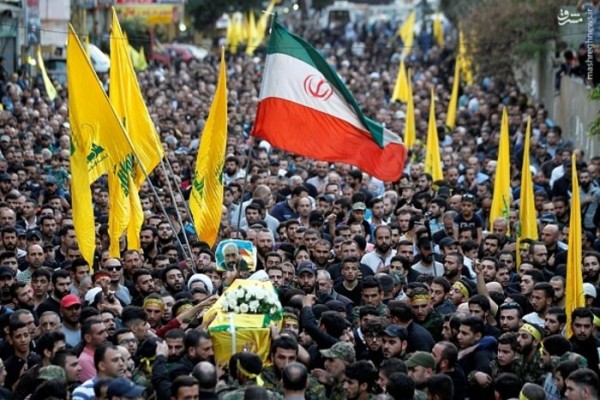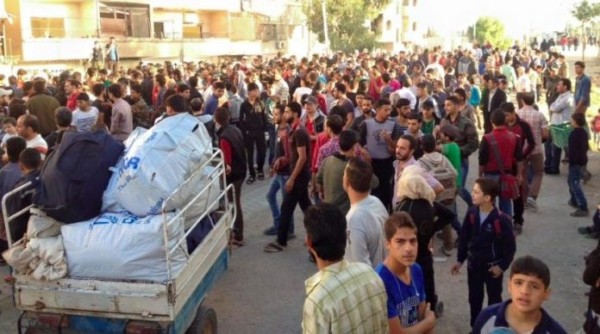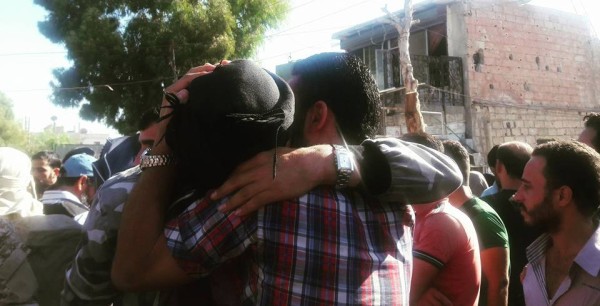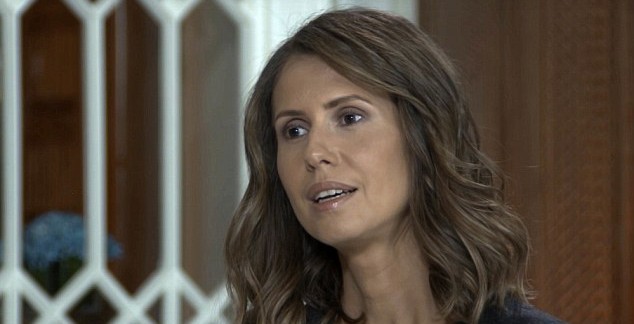LATEST
- Picture: Funeral for Top Hezbollah Commander Killed in Aleppo
- Regime Text Messages to East Aleppo:”Whole World Sacrificed You to Meet Your Lethal Fate”
- Russia’s Putin & Turkey’s Erdoğan Discuss Syria and Iraq
- Besieged Damascus Suburb of Moadamiya Surrenders After 4 Years
- Impending Fight Between Rebels and Kurdish Militia in Northwest?
- Regime Declares Threat of “US- and Saudi-Backed” ISIS Moving from Iraq’s Mosul Across Border
In its latest PR effort, the Assad regime has used the First Lady to defend her husband and the suppression of Syria’s uprising.
Set up by easy questions from a Russian interviewer, Asma al-Assad begins with the depiction of a Syria before the March 2011 uprising as one of “significant economic growth”, the “opening up of the economic landscape”, and “unprecedented legislative reform”. She even claims that the regime was working with “civil society organizations to make them stronger.”
She declares, “Throughout all of this, my role has been to strengthen Syrian social fabric….From the beginning, I was drawn to helping empower people, often with limited resources, to make the best of their lives.”
Today she says that her goal is to help “martyrs’ families”, the injured, and the displaced: “We owe it to them to honor their sacrifice.”
A British-Syrian national raised in the UK, Assad graduated from King’s College London in computer science and French literature and briefly was in international investment banking before she married Bashar al-Assad in December 2000, soon after he inherited the Presidency from his father Hafez.
Throughout the uprising, she has been prominent in PR efforts showing care and affection for the Syrian population, including visits to schools, hospitals, and centers for those who have been displaced. She is one of the co-founders of the Syrian Arab Red Crescent and its President for life.
Despite this projection of her image, she was placed on the European Union’s Syrian sanctions list in 2013.
This week’s interview is reminiscent of a fawning profile of Assad in Vogue magazine in February 2011, “A Rose in the Desert“. It portrayed Asma and the President as a “wildly democratic” family-focused couple who vacation in Europe and foster Christianity — and had made Syria the “safest country in the Middle East”.
The article was arranged by the US lobbying firm Brown Lloyd James, paid $5,000 per month by the Assad regime to oversee the project. Vogue withdrew it soon after the start of the Syrian uprising.
Picture: Funeral for Top Hezbollah Commander Killed in Aleppo
Wednesday’s funeral in Beirut for senior Hezbollah commander Hatem Hammadi and another fighter, who were killed on the front southwest of Aleppo city last weekend.

Hammadi, who led an elite Hezbollah unit, died when an improvised explosive device struck his vehicle in the 1070 housing complex, close to the frontline between pro-Assad forces and rebels.
Regime Text Messages to East Aleppo:”Whole World Sacrificed You to Meet Your Lethal Fate”
The Assad regime is sending text messages to the residents and rebels of opposition-held east Aleppo:
“Armed men in East Aleppo, the promises of aid, supporting troops and weapons will not be kept. The whole world has let you down and sacrificed you to meet your lethal fate.
Tex messages being sent to mobiles in E Aleppo from the government of Syria. They say… pic.twitter.com/BnNtDdx2Ea
— alex thomson (@alextomo) October 19, 2016
Russia’s Putin & Turkey’s Erdoğan Discuss Syria and Iraq
Russian President Vladimir Putin and Turkish counterpart Recep Tayyip Erdoğan discussed developments in Syria and Iraq in a phone call on Tuesday.
No details were given, but a staffer in Erdoğan’s office said Putin “congratulated Turkey for its success against the Islamic State of Iraq and the Levant in Syria”.
The two men also agreed to accelerate efforts to end the conflict in Aleppo and deliver humanitarian aid to the city, according to the source.
A reconciliation between Erdoğan and Putin, following Turkey’s downing of a Russian warplane near the Turkish-Syria border last November, has led to speculation that the two men have struck a deal over operations in northern Syria.
Turkey has backed the Syrian opposition and rebels, while Russia is an essential backer of the Assad regime.
However, claims are circulating that Russia accepted Turkey’s military intervention alongside rebels in northern Aleppo Province from late August, in return for Ankara’s acceptance of the Russian-regime siege and attacks on Aleppo city.
Besieged Damascus Suburb of Moadamiya Surrenders After 4 Years
Residents and rebels in the besieged Damascus suburb of Moadamiya have capitulated after more than four years of siege and attacks.
Buses have entered the town, southwest of the capital, to take those who are refusing the “reconciliation agreement” to Idlib Province in northwest Syria.

The Syrian military cut off Moadimiya in late 2012, a siege which eventually led to the deaths of more than 100 people from starvation and the protracted suffering of many more.
The regime has continued to maintain the pressure with bombing as well as the blockade of supplies. In August, the “surrender or starve” tactics finally forced the surrender of nearby Darayya.

Syria Feature: Chemical Attack, Siege, and Now Walled In — The Damascus Suburb of Moadamiya
Syria Feature: “Slow Death” as 100s Wait for No Medicine in Besieged Moadamiya
Impending Fight Between Rebels and Kurdish Militia in Northwest?
Observers are foreseeing a battle between Syrian rebels and the Kurdish militia YPG in northwest Syria.
The frontline between the two sides has been closing since late August, as the rebels — supported by Turkish airpower, tanks, and special forces — have pushed back the Islamic State in northern Aleppo Province.
Having cleared ISIS from a 55-km (34-mile) strip along the Turkish-Syrian border, the Free Syrian Army and allies are moving further into the province. On Tuesday, an FSA unit posted a video announcing the goal of taking Tel Rifaat, lost to the YPG in early 2016.
The soldiers told civilians to leave the area within 48 hours, before the beginning of the attack on the town, 40 km (25 miles) north of Aleppo city.
They referred to the YPG as the Turkish Kurdish insurgency PKK. Both rebels and Turkey assert that the YPG is actually part of the PKK, which has been battling the Turkish Government for more than 30 years.
Tension has grown between rebels and the Kurdistan Democratic Union Party (PYD), the political faction overseeing the YPG, since the Kurds — with significant US support — began advancing against the Islamic State in 2015.
Fighting broke out in the mainly-Kurdish area of Sheikh Maqsoud in Aleppo city, and the YPG began the capture of opposition territory in Aleppo Province, closing on the town of Azaz on the Turkish-Syrian border.
The Syrian opposition and rebels claim that the PYD — which has become the powerful force in the Syrian Kurdish movement in an internal battle with other factions — is trying to connect the Afrin canton in the northwest with the larger cantons of Cezire and Kobane in the northeast.
Free Syrian Army fighters: “We’re coming [to Tel Rifaat]. Prepare yourself.”
#FSA Fighters from #Tal_Rifaat send a message to the #YPG in their village that we're coming prepare yourself
Miss to my village Tal Rifaat pic.twitter.com/PErIdfoPrL— Ahmad Alkhatib (@AhmadAlkhtiib) October 16, 2016
Regime Declares Threat of “US- & Saudi-Backed” ISIS Moving from Iraq’s Mosul Across Border
The Syrian military is playing up the threat of Islamic State fighters fleeing across the border from Mosul, as Iraqi forces and their allies try to recapture the country’s second city.
The General Command issued a statement on Tuesday that “supporters of international terrorism are trying to secure safe routes and corridors for the ISIS terrorists”, accusing the US and Saudi Arabia of a “malicious scheme”.
The military asserted that Washington, Riyadh, and others want to “impose a new military reality” by bolstering the Islamic State in eastern and central Syria. They said ISIS will be strengthened in Deir ez-Zor Province where it has been challenging the Assad regime and in its central position of Raqqa. They even claimed that the Islamic State would be backed in an attempt to capture Palmyra, the historic city which it lost to pro-Assad forces in March.
The Assad regime has long accused outside powers of supporting the Islamic State, as part of its portrayal of the Syrian uprising as foreign-backed “terrorism”.
Last month, it renewed the allegation of US backing of ISIS when American warplanes accidentally hit Syrian troops, killing more than 60 of them, on a frontline with the Islamic State in Deir ez-Zor Province.

